Brits v. the Yanks
An Example of How Institutions Matter.
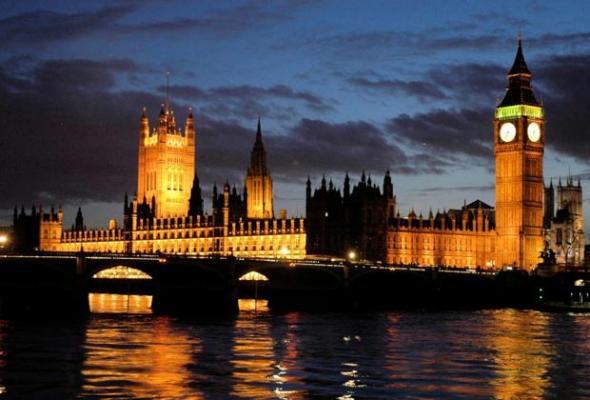 As Doug Mataconis has already noted, British Prime Minister David Cameron suffered a significant loss in a nonbinding vote on intervention in Syria in the House of Commons today. This is more dramatic than it might sound to an American ear given that the very nature of a parliamentary system means that the PM has a majority of seats in the chamber supporting the cabinet. As such, PM’s tend to win when they bring items to a vote.
As Doug Mataconis has already noted, British Prime Minister David Cameron suffered a significant loss in a nonbinding vote on intervention in Syria in the House of Commons today. This is more dramatic than it might sound to an American ear given that the very nature of a parliamentary system means that the PM has a majority of seats in the chamber supporting the cabinet. As such, PM’s tend to win when they bring items to a vote.
This situation fits within the broad notion of how institutions matter that was raised in my post on reform a few days ago. Let’s consider a few things.
1. Institutional Design Affects Policy-Making. In the separation of powers system of the United States, the president is the commander-in-chief of the US military and is also vested with an array of foreign policy powers. The nature of these powers lead directly to the ability of the president to act unilaterally in these area. (But wait! you say: what about checks and balances?—I will return to that below in point #3). However, in the fusion of powers system in the UK the PM is directly accountable to the Parliament and has to directly answer its questions and obtain votes of support.
In simple terms: the institutions in the UK forced a debate and a vote while the institutions in the US make a debate and vote far less likely. Indeed, all congress could really do at the moment is debate a non-binding resolution directing the president to either bomb or not bomb. Actually stopping the action would require even more complicated legislative action, given that they cannot issue military orders. Even a move to defund the operation would not be immediately efficacious. Indeed, if President Obama were, in fact, hell-bent on the action, there is little that could be done to stop the action. Further, as we know, the congress has a tendency to weasel out of these types of hard debates.
2. Accountability Matters. We know that public opinion in the US and UK heavily oppose a military strike in Syria. As such, it stands to reason, at least in the abstract, that in democratically governed countries the leaders would have to listen to the public. In the UK, the representatives of the people were given the chance to speak (and will get the chance to speak again if another vote is taken next week). Meanwhile in the US the president could very well order a strike tonight if he so chose, without any consultation whatsoever.
One of the issues that I find troubling about US politics is that politicians are less accountable to the public than we pretend is the case. (Of course, this goes beyond issues such as this one, but surely the lack of democratic accountability is pretty clear here, yes?).
3. Age Matters. By “age” I meant the age of the institutions. The Framers thought that they were constraining the president in military matters by two mechanisms: the lack of a standing army (and therefore the need of Congress to have to call one up to fight a war) and the fact that Congress had to declare war (indeed, these are linked issues). In 1787 it was beyond the realm of reason and imagination that a president could, with a few spoken words, unleash amazing amounts of violence halfway around the world. Wars were fought on a battlefield between large masses of men with muskets and cannons. Such conflicts took time to get started and they required extensive planning and logistics. This has not been the case for some time. War making has been tilted heavy in the direction of the executive for decades, if not a century or more, and the combination of a standing military (and a massive, globally positioned one at that) and technology has utterly transformed the Framer’s vision for what it means to be commander-in-chief. There really is not much in the way of an effective check on the president’s war-making powers. The decades-long unwillingness of Congress to go to the mattresses over the War Powers Act illustrates this as does the recent example of Libya.
Note: this post was inspired by a couple of FB posts/comments by my friend and co-author, Matthew Shugart, who commented on the vote at his blog: British MPs say no to Syria attack who noted:
Earlier in the day I was listening to much of the UK Commons debate on whether to attack Syria. I could not help but feel it buttressed the general consensus among most of us in political science who study executive-legislative politics that a parliamentary system is just so vastly superior to America’s presidential one.
As one of those political scientists, I have to say I had similar thoughts earlier today and to re-iterate what I said above: at least the British are getting a public debate.
Note: I am not trying to make any specific reform arguments here. However, I am trying to illustrate the way in which there are real world ramifications that derive from the institutions that govern us.

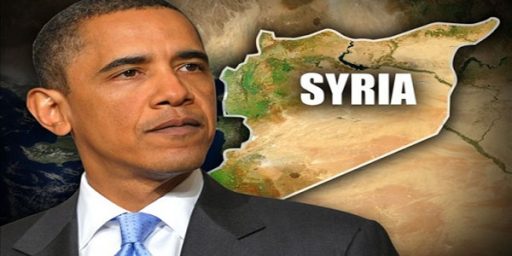
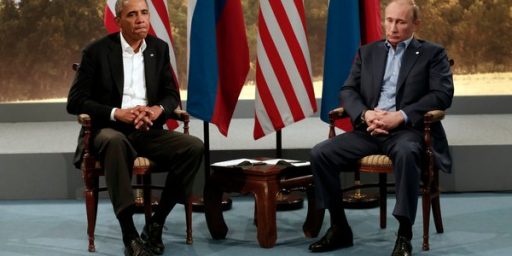

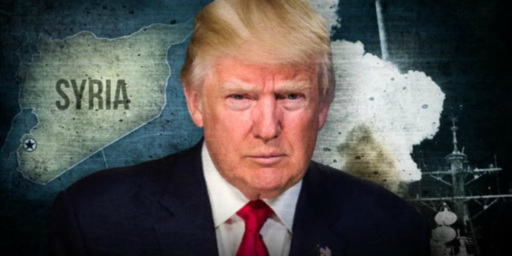
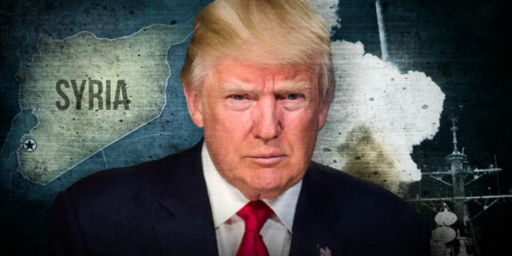
One vitally important point: Cameron leads a minority government. His Conservative party has a plurality but requires the support of the Liberal Democrats to win a majority in parliament. As such, while obviously a major defeat it isn’t quite the same as if his party had a majority. If they did and lost a major vote like this (even if not considered a confidence matter) Cameron would likely be fighting for survival as leader of both the country and the party.
@MichaelB: Well, he leads a coalitional cabinet, not a minority government (which has a specific meaning that does not apply here).
While I agree that if he had a majority of Conservative seats this defeat would have been even more dramatic, make no mistake that this was a major defeat
@MichaelB: I would note, and to a major part of my point: even if Cameron had a large majority in the House, there still would have been a debate and a vote.
Not so surprising. Tony Blair was known as “poodle”because he would wag his fanny every time Bush called. Nice to see them acting like a sovereign nation for once.
@Laurence Bachmann: But the thing is, it is
While this is the case de facto, it is not the case de jure:
While the command of the armed forces is clearly the president’s realm, it’s equally clearly congress’s realm to establish the boundaries in which those commands are issued. Most importantly, the decision about when to get started was supposed to be Congress.
Sadly, the spineless twits that fill our legislature have happily allowed the executive to usurp that authority, relieving them of the burden of having to take a position on any important matter. Now regardless of what happens in Syria, they may in six months argue that they would have wanted the president to do something else and are thus not responsible for the current state of affairs.
@Stormy Dragon: This is where theory and reality diverge. Even if Congress were to forbid military actin in Syria, they do not control the executive. The president can order the troops there, and Congress would have to go to court to stop him. And as far as I know, three things would complicate matters:
1. The question if Congress has standing, if it doesn’t there is very little that can be done to stop the president, except impeachment, which is unlikely.
2. If I understand it right, Congress cannot charge the president until the military action already started, at which point it would become pretty useless, and could even be harmful for the troops if they have to withdraw suddenly (which would be a political disaster for congress). At the same time the courts would probably be very reluctant to issue any rulings against the president while the war is still ongoing.
3. As far as I know US law there is no fast-track approach for Congress, it has to go through the lower courts one at a time until it reches the Supreme Court, at which point the war could already have ended, possibly taking away the grounds for the lawsuit.
So in reality there is pretty much nothing that Congress could do to stop Obama. If I contrast this with the system here in Germany, parliament has to vote before military actions can take place, similar as in the USA. But if the executive would ignore this rule and be commited to act without authorization, there is one obvious remedy:
A (constructive) vote of no confidence would topple the government, by replacing the current chancellor with another person, who probably made very strong assurances to not ignore the wishes of parliament. And since parliament exercised this right already once over mere policy preferences, a blatant unconstitutional violation of parliament’s rights by the chancellor would most likely be the second time that it replaces the government.
@Laurence Bachmann:
Eh, except it was the other way around in this case. Cameron’s been agitating for a military response for months while Obama’s been extremely reluctant. Then just after getting the US admin on board for limited cruise missile strikes we all got to watch this bizarre act of international, political malpractice on Cameron’s part.
http://www.telegraph.co.uk/news/worldnews/middleeast/syria/10275158/Syria-crisis-No-to-war-blow-to-Cameron.html
@Stormy Dragon: Yes, but almost all of that list, if not all, pertains to long-term support and direction (through budgets and legislation). Congress’ ability to quickly legislate a barrier to presidential action in this case is practically nil.
And really, once we decided, quite some time ago now, that we would not only have a standing military, but a rather large one, the ability of the Congress to be directly involved in setting military policy on a specific case basic diminished substantially. That situation truly remade the constitutional order that the Framers thought they were creating. It is a key example of an 18th century institution based on the way the world worked at that time that has long since ceased to be the case.
“even if Cameron had a large majority in the House, there still would have been a debate and a vote.”
Not neccesarily.
I suspect a the reason for the PM deciding there had to be vote on this issue was a the degree of unease among the Conservative Party and MP’s.
However legally making war remains a royal prerogative power; in effect it is delegated to the PM/Cabinet as servants of the Crown NOT of Parliament.
In practice it would be very foolish PM who invoked prerogative without being certain he had rock solid backing from his party (or parties in this case).
But it is notable that in 1999 a proposal to transfer the prerogative power to Parliament, even though restricted to Iraq, was refused consent for debate by the Queen, and was removed from a bill passed in 2010 before receiving royal assent.
@Tran:
They could also impeach him.
@Steven L. Taylor:
As I said, the President has the power de facto, if not de jure.
@Steven L. Taylor:
So, Steve, you want the USA to get a more “parliamentary” form of government, with the the President being both the leader of the executive and legislative branches yet being subordinate to the legislature . I agree with you, basically. But how do we get there from here?
Imagine that! The people actually having a voice and being listened to. Here we have a voice but special interest groups override anything we have to say! Touting their wares regardless of what we the people want! We need a parliamentary system here. Make those Republicans stand up and explain themselves instead of just voting NO on everything with no explanation! Our system really is laughable.
I think your argument; that the nature of the respective institutions have an effect on outcomes, is well stated. But I think the personalities involved have an effect as well. We all know the Republican Congressional Caucus is in constant reflexive opposition to the President. I would argue that has as-great, if not greater, ramifications than the Institutions themselves.
It doesn’t have to be that way…but it is the reality of what Republican Fundamentalists have become.
Leadership crisis.
One of every five Tory MPs either voted against the PM or abstained.
(Add to that that 42% of LibDem MPs voted against the PM or abstained.)
Do UK bookies accept bets on whether Cameron or Assad gets booted first?
I think there’s more to the differences between their system and ours than just a parliamentary system vs. our system of representation.
Each member of Commons represents a much smaller constituency than our representatives do, on average they’re much younger and serve for much shorter periods, and come from a much greater diversity of backgrounds, i.e. most aren’t lawyers whether barristers or solicitors.
@John SF: Point taken and agreed about the prerogative powers.
However, the important dynamic is, as you note,
Exactly.
@Dave Schuler: The US House is too small–I concur.
And yes, there are multiple differences, but the basic dynamic is very much being driven by institutional design. Note that the President of France is unlikely to call a debate from the National Assembly on this topic (and there, of course, numerous differences in the French system, but on this score, presidentialism is a key variable).
@Stormy Dragon:
No quickly, though. No enough to impede the policy.
There is also the pesky 2/3rds requirement in the Senate to remove.
@Steven L. Taylor:
Oh, I’m not under any illusion it could actually happen. As I said, the big problem here is that congress LIKES being able to push all of its responsibilities onto the President. But impeachment is congress’s ultimate check on the presidency, and if the congress were serious about protecting its prerogatives, the threat of future impeachment would be the main thing forcing the President to wait for congress to decide whether or not to go to war.
@Tran: “As far as I know US law there is no fast-track approach for Congress, it has to go through the lower courts one at a time until it reches the Supreme Court, at which point the war could already have ended, possibly taking away the grounds for the lawsuit.”
And that’s assuming that the courts took it; I can see SCOTUS quietly telling the lower courts to refrain from hearing any such suits.